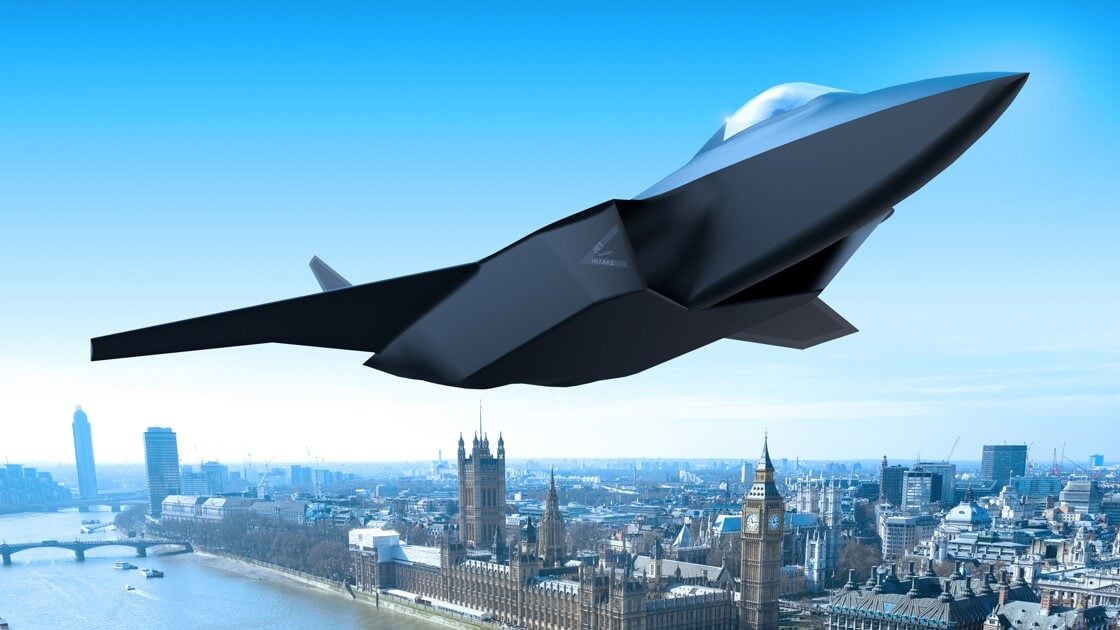
An artist’s impression of the UK-Japanese-Italian Global Combat Air Programme fighter jet (BAE Systems)
TOKYO — It appears unlikely the multilateral Global Combat Air Program (GCAP) will be adding Sweden as an international partner, following comments made by key industry players last week at DSEI Japan.
Addressing the media at the event on March 15, senior leadership from GCAP’s defense industrial base stated it remained “undecided” at this moment in time whether Sweden will be allowed to join Italy, Japan and the United Kingdom in developing a sixth-generation combat fighter by 2035.
But, according to Andrew Howard, Leonardo UK’s Director for Future combat Air/GCAP UK, Sweden is “not seen as an integral part of the partnership at this time.”
“I think it’s well understood that the UK had done some early work with Sweden exploring the possibility of partnership,” Howard said. “As you can see, very evidently, they’re not part of the GCAP team. And they’re not seen as an integral point as a partnership at this point in time. It’s a different type of exploratory activity that government took earlier on, so it’s not envisaged today.”
RELATED: New UK-Japan-Italy fighter takes shape, with electronics details emerging
Sweden had previously been an “observer” in the UK’s Future Combat Air System (FCAS) program, a technology initiative established in 2018 to conduct sixth-generation combat air research and development.
In 2019, Sweden signed a Memorandum of Understanding with the UK to collaborate on a joint combat air development and acquisition program, including the development of new concepts to meet both nations’ future requirements. Shortly after, Italy also joined on.
But as an industry source explained to Breaking Defense, over time it emerged Sweden’s vision “didn’t quite line up with what the UK and Italy wanted, but they continued to have interest in some aspects of the program and future combat air technologies.” Ultimately, when the FCAS effort morphed into the GCAP effort, Japan effectively replaced Sweden as a third partner.
However, there have been reasons to believe Sweden could end up joining up with GCAP. Most notably, in December Japan and Sweden reached an “Agreement on the Transfer of Defense Equipment and Technology,” designed to encourage bilateral cooperation between the two countries. This particular agreement included scope for collaboration on GCAP, defense sources told Breaking Defense. Sources also said Sweden had been interested in tracking GCAP to help support future upgrade work on its own Gripen fighter, as manufactured by Saab.
In response to an inquiry from Breaking Defense, a Saab spokespersons aid: As a consequence of the new geopolitical situation, the decision to increase the defence spending, and the NATO application, Sweden has decided to increase and focus on national studies which will be required to decide how to best shape our future. Regarding how Sweden will relate specifically to the GCAP programme, this should be answered by the Swedish authorities. Saab’s focus is and has been to support the Swedish authorities in their reviewing of their Future Combat Air strategy.”
A request for comment to the Swedish Ministry of Defence was not returned by press time.
Elsewhere, ELT’s vice president for global sales and business development, Giovanni Zoccali also suggested the GCAP would not consider integrating sub-systems from providers outside of the current team.
“In this premier phase, we don’t care about different suppliers. It’s important we focus within our three nations,” he asserted.
At the same media briefing however, Howard went on to highlight the importance of multi-national interoperability both inside and outside GCAP membership as the program continues to develop.
“Clearly interoperability on our future platform is absolutely critical. We absolutely expect the GCAP platforms to be highly optimized to operate effectively with the F-35 and other platforms.”
Finally, Howard portrayed the future competitive landscape for the GCAP as the team seeks to export the sixth-generation solution beyond Italy, Japan and the UK.
“We’re obviously aware of a second European program [SCAF/FCAS] being led by the French and Germans which is broadly similar in a slightly later timescale, with some level of similar ambition to what we’re pursuing here. So we expect that platform to be a competitor probably a few years after we have started delivering capability,” Howard said.
“Of course, we also expect the F-35 to still be an active platform in the world market. And upgrades of the [Eurofighter] Typhoon is likely to be continuing also in this timeframe, but I think it’s probably less likely to be a core competitor to us. We’re very confident that the scale of requirements in our three nations makes the [GCAP] program viable. And we have an ambition to export products,” he concluded.






















